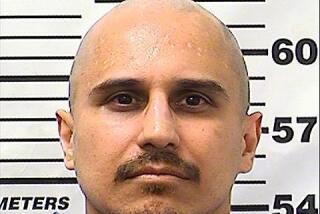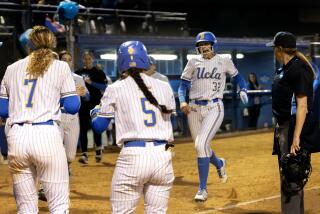Athletes Deserve the Right to Work
When we talk about college sports, we tend to talk only about football and basketball, the big money-makers.
The NCAA thinks the same way. It gets so caught up in regulating football and basketball players it forgets about people like Jaime Martinez.
Martinez was a standout cross-country runner at Orange High School, a state champion and The Times Orange County runner of the year. UCLA, Arizona and USC wanted to offer him scholarships, but he couldn’t take them. He wanted to work. He wanted to give some money to the parents who had helped him so much.
NCAA rules prohibited scholarship athletes from working during the school year. The universities don’t trust each other enough to believe that a star linebacker on the payroll would actually have to do work. They don’t know how they’d regulate his income even if he is doing legitimate work.
At its annual convention last January, the NCAA adopted Proposition 62, which would allow athletes to work during the school year and earn the difference between the value of their scholarship and the full cost of attending the school. That range was specified between $1,500 and $3,000 and was supposed to go into effect this school year.
Apparently, that still was too much for some people. A group of university presidents banded together this summer and pushed for a one-year moratorium on Proposition 62. They hope they can vote it out of existence at the next convention.
But even if it went into effect today it would be too late for Martinez. He chose to attend Azusa Pacific University, a member of the NAIA, which doesn’t have the same restrictions as the NCAA. He could go to school there and run and have a job.
It’s not as if things didn’t work out for Martinez, who is a senior. He is a two-time NAIA All-American. His team is competing in the NAIA Cross-Country National Championships this weekend and Martinez could finish among the top five.
He has balanced his running, working and studying and is set to earn his degree in physical education in May--thus becoming the first member of his family to graduate from college.
Still, why should anyone who works so hard not have every possible door open to him? How could NCAA schools not do everything they could to get someone like him on their campuses?
You won’t find any bitterness in Martinez, who is used to making the best of what life has offered him.
“I still feel the same way,” Martinez said. “I’ve gotten a good education here and I’m getting ready to graduate. Good school, good people, a real neat experience.
“The competition [in cross-country] is right there. There’s just as good a competition as [NCAA] Division I. I don’t really feel like I’m missing out on the competition.
“As far as big-time school recognition, I’m not really too into that. As long as I get a diploma.”
It’s amazing he even got a high school diploma, considering the schedule he kept. In his junior year he would arise at 2 a.m., help his brother fold newspapers and deliver them on his route, return home at 6, shower and get ready for school. He did his homework at lunch and between periods. After getting home from practice, he usually crawled into bed by 8 p.m.
Working was just the family way. It’s what his grandfather preached to his father. It’s the example his father set for him.
Guadalupe Martinez used to drive a truck from 10 p.m. to 6 a.m., then come home and tend to the six children while his wife, Maria, went to work during the day.
By age 6, Jaime was helping his mother when she sold clothes at swap meets. He started making some money on his own by providing translation for a man who sold parakeets.
He worked alongside his mother at a second-hand store. He helped deliver newspapers in high school.
Even though he had a scholarship to college, he still wanted to work. His father was worn out from too many years of too little sleep. His older brothers and sisters had children and families of their own. Martinez wanted to make sure his parents had money.
So he painted. He had never painted before and wasn’t that good, but he sure got enough practice over his first three years at Azusa Pacific. He painted classrooms and dorm rooms on campus. He painted all of the rails on the science building.
The room we used for the interview? That was his work too. Nice and bright.
This year he took a new job as a personal trainer at the campus fitness center. It’s a little more in line with his desire to be a teacher and coach. He works 15-20 hours a week. That’s in addition to running 70-75 miles a week to stay in condition. And the books.
“When you’re doing it, you’re doing it,” Martinez said.
He doesn’t spend a lot of time lamenting over the things he doesn’t have, like free time. He spends more time thinking about what he has. His dorm room seems like “a mansion” after spending his first years living in a garage and later sharing that one-bedroom house in Orange with eight other people.
“Some people have it a little better,” Martinez said. “I’m not saying it’s a bad thing. They’re very fortunate to have what they have. I don’t know if they do, but if they would sit there and think how blessed they are, I don’t think they would take it for granted. You tend to appreciate more when you don’t have much.
“I’ve got my little beat-up truck, ’86 Mazda, that I’m pushing around. It breaks down here or there, but it gets me around. For me, that’s the world. Just like for somebody here, their Lexus or whatever they’re driving is their car.
“It gets frustrating. I could say it’s not fair. I only know that my day’s going to come.
“It’ll pay off in the long run. I’m just going to be patient.”
The NCAA could have claimed Martinez as its own success story. His improvement from a C student to B student in high school after coaches realized he had to pick up his schoolwork to meet NCAA standards would be a perfect argument for its initial eligibility requirements.
Instead, Azusa Pacific got a top-notch runner and will have an alumnus who will reflect positively on the university.
What the NCAA gets is a lesson, that maybe letting an athlete work isn’t such a bad idea after all.
More to Read
Go beyond the scoreboard
Get the latest on L.A.'s teams in the daily Sports Report newsletter.
You may occasionally receive promotional content from the Los Angeles Times.










